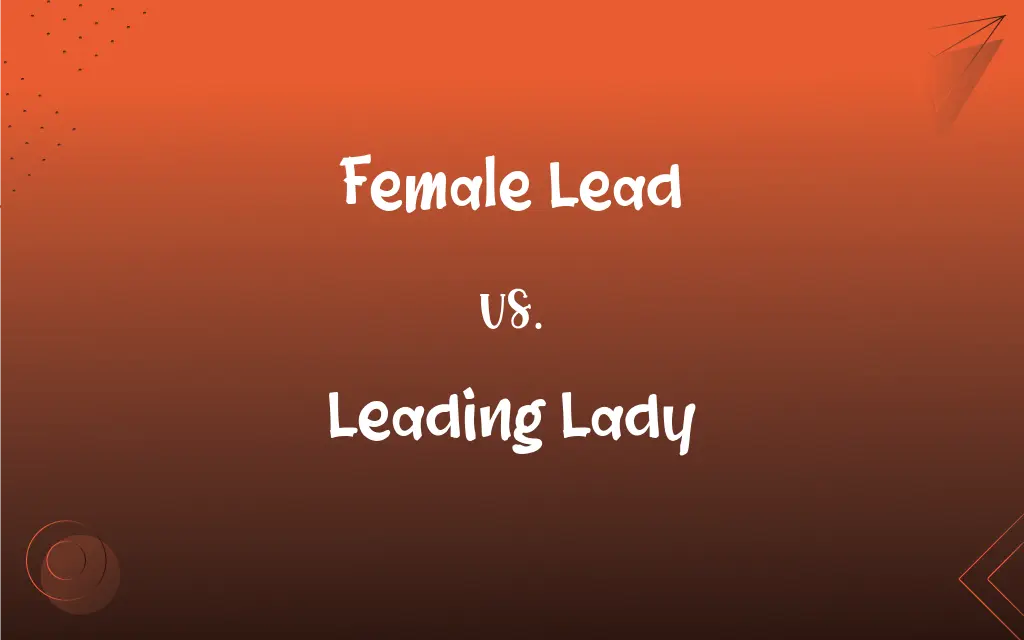Female Lead vs. Leading Lady: What's the Difference?
Edited by Janet White || By Harlon Moss || Published on January 17, 2024
Female lead refers to the main female character in a performance, while leading lady is a more traditional term often implying a combination of leading role and celebrity status.

Key Differences
The term female lead is used to describe the principal female character in a play, movie, or similar performance. Leading lady, on the other hand, carries a slightly more glamorous connotation, often associated with fame and charm.
Female lead focuses primarily on the role within the narrative, emphasizing the character's importance to the story. The term leading lady not only highlights the character's centrality but also often implies a sense of allure and public admiration for the actress.
In contemporary usage, female lead is a more neutral and inclusive term. Leading lady, while still used, can sometimes imply a traditional or classic role in line with older Hollywood styles.
The female lead can be characterized by her depth, development, and role in the plot. A leading lady, while also pivotal to the plot, is often perceived through the lens of her celebrity status and the charisma she brings to the role.
Both terms describe the main female character, female lead is more focused on the character's role in the story, whereas leading lady also encompasses the actress's charm and public image.
ADVERTISEMENT
Comparison Chart
Focus
Role in the narrative
Role and celebrity status
Connotation
Neutral, contemporary
Glamorous, traditional
Usage
Emphasizes character importance in the story
Combines character importance with public allure
Implication
Character depth and development
Charm, fame, and charisma
Contemporary Relevance
Frequently used in modern contexts
Often associated with classic cinema
ADVERTISEMENT
Female Lead and Leading Lady Definitions
Female Lead
Main female character in a story.
The female lead in the film was a strong, independent character.
Leading Lady
Celebrated female actor in a leading role.
The theater's leading lady was known for her charismatic presence.
Female Lead
Leading female character in a narrative.
The novel's female lead was a brilliant detective.
Leading Lady
Distinguished female actress in a central role.
The leading lady's talent shone through in her diverse roles.
Female Lead
Predominant female protagonist in a story.
The female lead in the series broke many stereotypes.
Leading Lady
Glamorous and principal female performer.
The leading lady's elegance captivated the audience.
Female Lead
Principal female role in a performance.
She was cast as the female lead in the new Broadway play.
Leading Lady
Famous actress in a principal role.
She became a leading lady in Hollywood.
Female Lead
Central female figure in a movie or play.
The female lead's performance was critically acclaimed.
Leading Lady
Main female star in a film or play.
The leading lady received an award for her performance.
FAQs
Does "leading lady" imply fame?
Often, it implies both a leading role and a level of celebrity.
Is "female lead" gender-specific?
Yes, it specifically refers to a female character.
Can a film have multiple female leads?
Yes, especially in ensemble casts.
Can a female lead be a supporting character?
No, a female lead is usually the main character.
Is "leading lady" an outdated term?
It's more traditional but still used in contemporary contexts.
Is "leading lady" synonymous with a diva?
Not exactly; a diva has more connotations of fame and temperament.
Can the female lead be an antagonist?
Yes, the female lead can be any central female character.
Can any actress be a female lead?
Yes, if she plays the main female role in a production.
Does "leading lady" refer to lead roles only?
Typically, it refers to the main female role.
Are female lead roles diverse in cinema?
There's a growing trend towards diversity in these roles.
Is "leading lady" used in theater?
Yes, it's common in both film and theater.
Can a young actress be a female lead?
Yes, age does not restrict someone from being a female lead.
Does the female lead always have to be a romantic interest?
No, the role can vary widely beyond romantic interests.
Are leading ladies always glamorous?
Not necessarily, but the term often carries that connotation.
Is "leading lady" a term of respect?
Yes, it's often used to denote respect and admiration.
Is the leading lady always the heroine?
Often, but she can play various roles, not just the heroine.
Does "leading lady" emphasize the actor more than the character?
It often highlights both the actress's charisma and her character.
Are female leads common in action films?
Increasingly so, as genres expand their representations.
Can animated films have a female lead?
Absolutely, animated films often feature female leads.
Can a leading lady be a role model?
Yes, particularly if she portrays inspiring characters.
About Author
Written by
Harlon MossHarlon is a seasoned quality moderator and accomplished content writer for Difference Wiki. An alumnus of the prestigious University of California, he earned his degree in Computer Science. Leveraging his academic background, Harlon brings a meticulous and informed perspective to his work, ensuring content accuracy and excellence.
Edited by
Janet WhiteJanet White has been an esteemed writer and blogger for Difference Wiki. Holding a Master's degree in Science and Medical Journalism from the prestigious Boston University, she has consistently demonstrated her expertise and passion for her field. When she's not immersed in her work, Janet relishes her time exercising, delving into a good book, and cherishing moments with friends and family.







































































